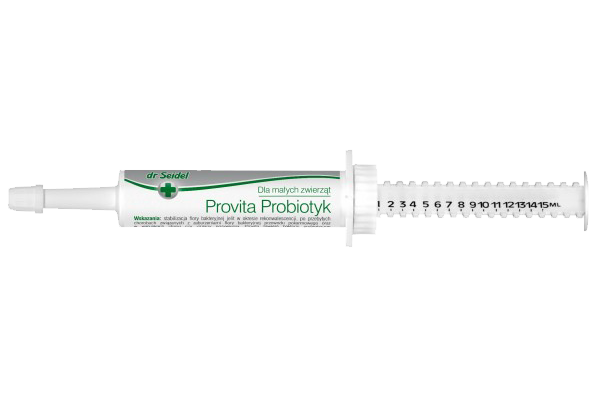Probiotics in the nutrition of dogs and cats
Probiotics in the nutrition of dogs and cats
One of the key elements for the health of dogs and cats is the health of the gastrointestinal tract. It is populated by the gut microbiota, or microorganisms, primarily bacteria, that reside in the intestines. The microbiota has very important functions in the body, including taking part in the absorption and metabolism of nutrients, producing substances such as vitamins, and influencing immunity. It is the caretakers of dogs and cats who largely shape the composition of the gut microbiota through the food they are fed. Disruption of the microbiota can lead to the development of various diseases and disorders, including diarrhea, inflammation and gastrointestinal infections.

Table of contents
What are probiotics?
According to the FAO (Food and Agricultural Organization) definition, probiotics are live microorganisms that, when administered in adequate amounts, exert beneficial effects on the health of the host. They are successfully used in human medicine to treat gastrointestinal diseases, and in livestock to prevent gastrointestinal infections. They are also increasingly used successfully in the nutrition of small animals: dogs, cats and rabbits.
Effects of probiotics on the body of dogs and cats
Manipulation of the gastrointestinal microflora with probiotics affects the functioning of the entire body on many fronts. Probiotics have a positive effect on the wall of the digestive tract, increasing mucus production, promoting epithelial renewal, protecting tissue during inflammation and promoting digestion. The use of probiotics is also an intervention in the structure of the microbiota of the digestive tract of dogs and cats. Probiotic bacteria help control the population of pathogenic pathogens by competing for space in the digestive tract or producing organic acids, and promoting the presence of commensal bacteria (beneficial to the host). Probiotic organisms can also improve immunity by enhancing humoral immunity and antibody production.
In which cases to use probiotics in dogs and cats?
Acute gastrointestinal diseases: which include acute diarrhea of various causes, infections and inflammations of the gastrointestinal tract. Administration of a probiotic can shorten the duration of diarrhea, reduce the frequency of bowel movements and improve the quality of feces and the animal’s appetite. The use of probiotics reduces the number of pathogenic bacteria by supporting the fight against gastrointestinal infections. Probiotics given preemptively help prevent diarrhea caused by exercise or stress associated with, for example, a change of location.
Chronic gastrointestinal diseases: Probiotics support the treatment of chronic diarrhea by, among other things, improving stool consistency and bowel frequency. In animals with IBD (Inflammatory Bowel Disease), probiotics can support therapy by inducing an anti-inflammatory immune response and normalizing intestinal dysbiosis.
Antibiotic therapy: Antibiotics administered during treatment, can reduce the population of good bacteria populating the gastrointestinal tract. Using probiotics during antibiotic therapy restores a healthy microbiota.
Atopic dermatitis: Some probiotics can help relieve the symptoms of dermatitis, including improving skin lesions in dogs.
The use of probiotics affects the entire body, so interference with the microbiota should not be used without reason. While administering a probiotic does not replace treatment or dietary changes, which are necessary for many diseases, it can support therapy.
What to look for when choosing a probiotic for dogs and cats?
When choosing a probiotic for our pet, it is important to pay attention to whether the preparation is accurately described. The packaging should contain information not only about the species of microorganisms used, but also about the specific strain and the content of microorganisms in the dose. Choose preparations that contain bacterial strains with demonstrated efficacy in dogs or cats. Probiotics intended for humans may be ineffective or even harmful in animals, so it is advisable to reach for substances dedicated to our pets.
Provita — probiotic for dogs and cats
Provita Probiotic contains saprophytic lactic acid-producing bacteria and compounds that facilitate the growth of these microorganisms. After administration, the above bacteria colonize the digestive tract, changing the environment of the intestinal flora and thus preventing the spread of pathogenic microorganisms. Bacteria, vitamins and nutrients contained in the probiotic stimulate intestinal peristalsis. They improve food absorption and boost immunity. They accelerate weight gain, improve vitality and relieve stress.
Provita contains probiotic bacteria Enterococcus faecium, Bacillus Licheniformis and Bacillus Subtilus — they reduce the occurrence of unfavorable pathogens in the digestive system.

In addition, Provita includes:
Vitamins A and E — relieve stress, which is sometimes caused by a change of food, a move, a change of owner, the loss of a partner or cubs.
Yeast extract — has an anti-stress effect, increases immune function and counteracts cancer.
Barbara Marcinkowska
Dietetyk zwierząt
9 января 2024


